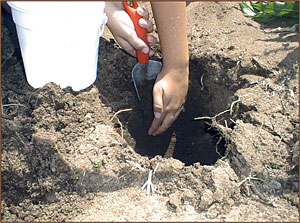Tips for building a healthy soil
Soil is the foundation for your plants. Focus on building a healthy soil, and your plants will benefit.
- Have your soil tested. Determine pH, salts and nutrient levels.
- Look at your soil. Is the soil rich in organic matter, does it have earthworms and does it hold moisture? Read Assessing Soil Quality to learn more.
- Desert soils have little organic matter. Add organic matter, such as compost, regularly to help hold nutrients and moisture in the soil. For landscape areas, dig in organic matter to a depth of 6 to 12 inches and mix well. Be careful not to damage the roots of existing plants.
- In vegetable beds, consider growing cover crops and green manures. These are temporary plantings that protect the soil from erosion and add organic matter. Turn them into the soil 2 to 3 weeks before planting new seed or plants. Learn more about cover crops.
- Never dig or till a soil that is wet. This will destroy the soil structure.
- Minimize tillage to maintain soil structure and reduce erosion.
- Test how well water soaks into the soil. Dig a hole, fill it with water, and see what happens. The water should seep into the soil at a minimum rate of ½ inch per hour. If drainage is poor, mix in organic matter and consider plant drainage requirements.
- Avoid compacting the soil. Limit vehicle or foot traffic, especially on wet soil.
- Keep bare soil covered with mulch or cover crops, so you don't lose it.
- Pesticide use can affect the organisms living in the soil that help break down the organic matter and make nutrients available to plants. Minimize use of pesticides whenever possible.

To learn more about your soil, dig a hole and look for signs of organic matter, earthworms and roots.
Hefner, M.
2019,
Tips for Building a Healthy Soil,
Extension | University of Nevada, Reno. IP


